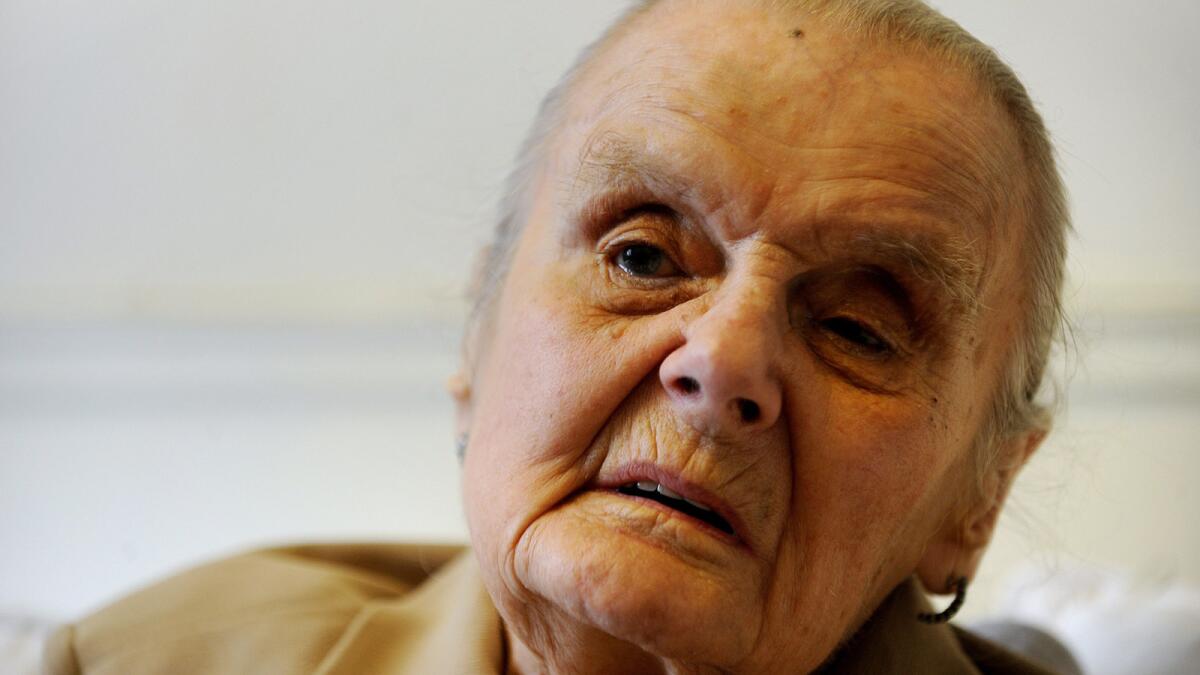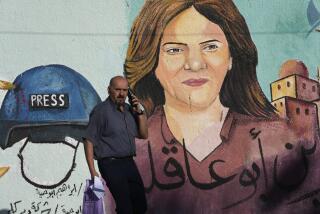Clare Hollingworth, the reporter who broke news of World War II, dies at 105

- Share via
Reporting from Hong Kong — Clare Hollingworth, a British war correspondent who was the first to report the Nazi invasion of Poland that marked the beginning of World War II, died in Hong Kong on Tuesday. She was 105.
The Foreign Correspondents’ Club of Hong Kong announced her death, calling her a beloved member with a remarkable career, including “the scoop of the century.”
A determined journalist who defied gender barriers and narrowly escaped death several times, Hollingworth spent much of her career on the front lines of major conflicts, including in the Middle East, North Africa and Vietnam, working for British newspapers. She lived her final four decades in Hong Kong after being one of the few Western journalists stationed in China in the 1970s.
She won major British journalism awards, including a “What The Papers Say” lifetime achievement award, and was made an Officer of the Order of the British Empire by Queen Elizabeth II. Former British Prime Minister Ted Heath and former Hong Kong Gov. Chris Patten were fans of Hollingworth, while various British generals wrote about her fondly.
The scoop that launched her career came in late August 1939, when she was a 27-year-old rookie reporter in southern Poland, barely a week into her job with Britain’s Daily Telegraph.
The border was closed to all but diplomatic vehicles, so she borrowed a British consulate official’s car to drive into German-occupied territory. She saw tanks, armored cars and artillery massing.
She recounted in her autobiography that burlap screens beside the road, “constructed to hide the military vehicles, blew in the wind, thus I saw the battle deployment.”
“I guessed that the German Command was preparing to strike to the north of Katowice and its fortified lines and this, in fact, was exactly how they launched their invasion in the south.”
Returning to Poland, she filed her story, but her name was not on the byline — a common practice for newspapers in those days.
She scored another scoop when the Nazis launched their invasion three days later on Sept. 1.
Her first call was to the British Embassy in Warsaw, but the official she talked to didn’t believe her.
“ ‘Listen!’ I held the telephone out my bedroom window. The growing roar of tanks encircling Katowice was clearly audible,” she recounted in her autobiography. “ ‘Can’t you hear it?’ ”
She then called the Telegraph’s Warsaw correspondent, who dictated her story to London.
As the Nazis advanced, Hollingworth scrambled to get out of Poland, sometimes sleeping in cars, eventually making her way to Romania.
Hollingworth was born Oct. 10, 1911, to a middle-class family in the village of Knighton in Leicestershire, England. Her father ran a boot factory founded by her grandfather. She took brief courses in Croatian at Zagreb University, international relations in Switzerland and Slavonic studies in London. She worked as a secretary and then at a British refugee charity in Poland while writing occasional articles about the looming war in Europe. Friends influenced her decision to focus on journalism rather than politics.
The Daily Telegraph’s editor gave her a job as a stringer and sent her to Poland, partly because of her work with refugees in that country, according to her great-nephew, Patrick Garrett.
During her five months with the charity, Hollingworth played an important role in helping an estimated 2,000 to 3,000 refugees flee from the Nazis to Britain by arranging visas for them, a fact that Garrett unearthed in research for his 2016 biography of his great-aunt, “Of Fortunes and War.”
Though she carved out a career in what was then a male-dominated field, Garrett said she looked back on her achievements matter-of-factly.
“She would never regard herself as a feminist,” Garrett said. She hated when women were given special treatment because it made women a “hassle,” which made it harder for other female journalists trying to cover wars, Garrett said.
“She thought that everyone should be treated the same. She hated it when women wasted time on makeup or getting their hair done,” Garrett said.
After the Polish invasion, Hollingworth covered the Romanian Revolution and hostilities in North Africa. When Allied forces captured Tripoli in 1943, British Field Marshal Bernard Montgomery ordered her back to Cairo because he didn’t want women around. So she instead got herself accredited with U.S. forces in Algeria.
Later she reported on the fall of the Balkan states to communism, and on Cold War espionage, including the case of Kim Philby, a British journalist and Soviet double agent.
Hollingworth wrote for many publications in her career, including the Economist, the Manchester Guardian and the Daily Express.
Hollingworth was close to danger for decades. In 1946, she was standing 300 yards from the King David Hotel in Jerusalem when it was destroyed by a bomb planted by militant Zionists that killed nearly 100 people.
While covering the Algerian war for independence in 1962, Hollingworth defied members of a French far-right group who rounded up foreign journalists and threatened some of them with execution.
“I was extremely annoyed at this treatment, and I told their commander in French, ‘Go away at once, monsieur, or I will have to hit you over the head with my shoe, which is all I have.’ ”
The commander pushed her aside, grabbed another British journalist and dragged him out the front door of their hotel. Hollingworth led the other reporters outside in pursuit of their colleague, who was thrown to the ground. The gunmen released the safety catches on their guns, and the reporters dove for cover, but they drove off without shooting.
Covering the Vietnam War, Hollingworth flew aboard U.S. military aircraft on supply runs and bombing missions.
Hollingworth became the Telegraph’s first resident China correspondent when the newspaper sent her to the capital then known as Peking in 1973, a year after U.S. President Richard Nixon’s landmark visit that eventually led to formal ties between the U.S. and China.
She moved to Hong Kong in 1981. She had intended to stay temporarily as she wrote a book about Mao Zedong, but decided to stay to watch the negotiations over Britain’s return of Hong Kong to China in 1997 and never left.
Hollingworth wrote articles for the International Herald Tribune and Asian Wall Street Journal well into her 80s. She was known for visiting the Foreign Correspondents’ Club every day, where her domestic helpers read newspapers to her because of her failing eyesight, and where friends and admirers helped her celebrate her 105th birthday with cake.
ALSO
Columnist Nat Hentoff, fierce champion of jazz and 1st Amendment rights, dies at 91
‘Batman’ actress Francine York dead at 80
Longtime community newspaper man and activist Jonathan Sanchez dies at 64
More to Read
Start your day right
Sign up for Essential California for the L.A. Times biggest news, features and recommendations in your inbox six days a week.
You may occasionally receive promotional content from the Los Angeles Times.







